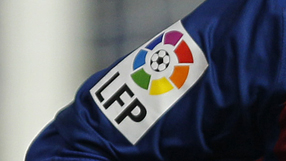Spanish spending rules unlikely to rein in clubs
MADRID - Spanish football's bid to police itself with rules aimed at curbing financial excess goes in the right direction but there are serious doubts as to whether it will be enough to reverse an entrenched culture of profligacy.

The country's professional football league (LFP), which groups the 42 clubs in the top two divisions, last week backed the proposals which are in line with UEFA regulations that begin to come into force next season.
Under the new rules, Spanish clubs will have three years to get their finances in order and the LFP will create a committee of independent professionals to analyse accounts and recommend sanctions for transgressors from the 2014/15 season onwards.
These could include docking points or the withdrawal of licences for the worst offenders.
"The intention is positive but I see a lot of practical problems in the implementation," said Jaume Llopis, a senior lecturer at the IESE business school in Barcelona.
"Given the state of many clubs' finances, it is going to be extremely difficult to enforce these rules within three years when the sanctions are due to kick in," he told Reuters.
"But at least it might force them to reflect and perhaps encourage some to be more rigorous in their management."
Recently published figures on the finances of Spanish football clubs make for grim reading and the lack of transparency and up-to-date accounts for some suggests the situation may be even worse than the available data indicate.
Get FourFourTwo Newsletter
The best features, fun and footballing quizzes, straight to your inbox every week.
Many clubs have drastically overspent on players and wages in an attempt to stay competitive and preserve their status in the top two divisions.
The Spanish system of clubs negotiating contracts with television companies individually, unlike in rival European leagues where a system of revenue-sharing is in place, has exacerbated the situation.
Around half the pot of Spanish TV income of some 600 million euros is paid to increasingly dominant Real Madrid and Barcelona, the world's two richest clubs by revenue.
"SOCIAL CHAOS"
Racing Santander this month became the latest side to seek protection from creditors, joining fellow La Liga clubs Real Mallorca and Real Zaragoza as well as all three teams promoted to the first division at the end of last season - Real Betis, Rayo Vallecano and Granada - in administration.
A study published last month by Jose Maria Gay, an accounting professor at Barcelona University, showed the 20 clubs in the top flight made a combined net loss of some 100 million euros in the year to the end of June 2010, up from around 19 million in the year-earlier period.
Total debt shrank slightly from the previous year, to 3.43 billion euros, but was still more than double revenue of 1.61 billion.
A separate study Gay published this month showed the 22 second-tier sides made a combined net loss of some 43.1 million euros in the 2009/10 season and total debt was more than 550 million.
Llopis at IESE noted several potential problems with the LFP's new regime and said that if the rules were applied to the letter around 50 percent of Spanish clubs would disappear, unleashing what he called "terrible social chaos."
One difficulty he picked out was that when Spanish clubs seek voluntary administration they are automatically protected from sanctions, which would render the LFP rules irrelevant.
Another problem is that football clubs have a special status in Spain and the authorities would be extremely reluctant to do anything that might threaten their survival.
"No government would ever have the courage to call in the debts to the social security system and the tax authorities for example," Llopis said.
"I don't think much is going to change because there are some things that are untouchable," he added.
"Do you imagine that a club like Real Madrid would ever be relegated to the second division because it had too much debt? Impossible. Nobody is capable of taking that decision."
REVENUE SHARING
Gay at Barcelona University noted that the LFP's planned committee of independent professionals would report to the league's existing Economic Control Committee.
"The doubt therefore arises that if an Economic Control Committee has already been in existence for some time then what exactly has it been doing," he asked.
"There are also question marks around who will be marking out the economic course for clubs to take and if they will have power and independence to decide.
"If they are not given independence this package of measures will be good for absolutely nothing."
Both Gay and Angel Barajas, an associate professor of financial management at the University of Vigo, believe the introduction of an effective system of TV revenue sharing would help to ease the financial difficulties of many clubs.
An agreement Real and Barca brokered late last year with 11 other top-flight sides on sharing some of the TV cash from 2015 is likely to cement their advantage while helping the others only marginally, analysts have said.
Figures collated by Gay for the 2009/10 season show Barca earned 158 million euros from their TV deal, or 26 percent of the total, and Real 136 million euros, or 22 percent.
Real's city rivals Getafe, UEFA Cup quarter-finalists in 2008, earned a mere six million, or one percent.
In the English Premier League, by contrast, Manchester United made 64.5 million euros from domestic TV rights in 2009/10, some 5.8 percent of the total.
Far smaller clubs such as Wolverhampton Wanderers (43.8 million) and Wigan Athletic (42.8 million) were given about four percent of the pie and seven percent was reserved for clubs who suffered relegation from the top flight.
Gay said clubs should take immediate steps to centralise the negotiation of TV rights and use the proceeds to renegotiate their most pressing debts.
"This needs to happen not in months or weeks or even days but in hours," Gay said. "Otherwise the dance of bankruptcies and insolvencies will continue."
